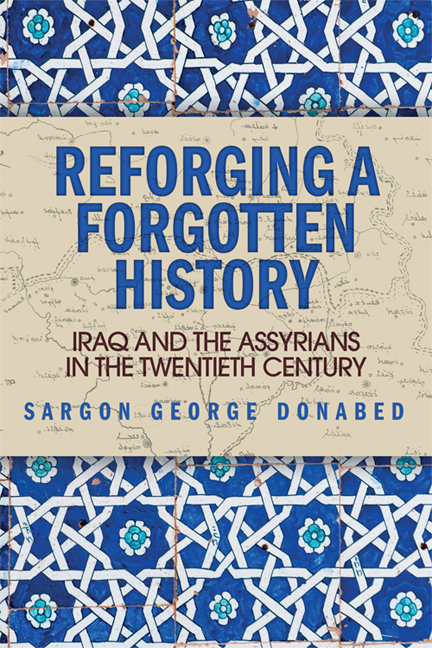Book contents
- Frontmatter
- Contents
- List of Figures
- List of Tables
- Abbreviations
- Acknowledgements
- Dedication
- Map
- Introduction
- 1 Integrating the Assyrian Question
- 2 Framing the Assyrian Narrative: Late Nineteenth and Early Twentieth Century
- 3 Iraq: Building a ‘Nation’-State
- 4 The Birth of the Republic and an Autonomist Struggle
- 5 Enduring Discord: Political Machinations and Border Clearings
- 6 New Movements and War on the Horizon
- 7 State Formation, State-building and Contentious Pluralism
- 8 Conclusion
- Glossary
- Appendix A Village Data
- Appendix B Documents Concerning Cultural and Political Organisations
- Bibliography
- Index
5 - Enduring Discord: Political Machinations and Border Clearings
Published online by Cambridge University Press: 05 September 2016
- Frontmatter
- Contents
- List of Figures
- List of Tables
- Abbreviations
- Acknowledgements
- Dedication
- Map
- Introduction
- 1 Integrating the Assyrian Question
- 2 Framing the Assyrian Narrative: Late Nineteenth and Early Twentieth Century
- 3 Iraq: Building a ‘Nation’-State
- 4 The Birth of the Republic and an Autonomist Struggle
- 5 Enduring Discord: Political Machinations and Border Clearings
- 6 New Movements and War on the Horizon
- 7 State Formation, State-building and Contentious Pluralism
- 8 Conclusion
- Glossary
- Appendix A Village Data
- Appendix B Documents Concerning Cultural and Political Organisations
- Bibliography
- Index
Summary
Perhaps the most significant moral characteristic of a nation is its hypocrisy.
Reinhold NiebuhrIn March 1970, the Iraqi government and Kurdish parties agreed on a peace accord that would grant the Kurds some semblance of autonomy and end the ongoing armed autonomist movement. The 11 March manifesto recognised Kurdish as an official language and amended the constitution to state: ‘The Iraqi people are made up of two nationalities, the Arab nationality and the Kurdish nationality.’ The Assyrians had been left out of the political meetings, as the events of 1961–3 had decimated their northern villages. Despite this detail, the Iraqi government was still wary of Assyrian–Kurdish relations – so much so, that on 24 April 1970, Mar Eshai Shimun, exiled Patriarch of the Church of the East, was personally invited to meet the Iraqi President in Baghdad in a bid by the government to reconcile old differences.
The government restored his citizenship as he was greeted by thousands of Iraqi Assyrians upon arrival. The patriarch lauded president al-Bakr and gave a positive interview of that historic meeting to the Baghdad Observer on 30 April 1970. Iraqi officials began to play both sides against the middle. The government used this invitation to garner ecclesiastic support and to attempt to exert control over a portion of the Assyrian population by playing to its religious leaders. The regime's proposal was to fashion an Assyrian police force (reminiscent of the levies) in order to buffer foreign advances. Indeed the patriarch commented on the progressive steps of the Ba‘th government under al-Bakr to grant the Kurds yet further concessions as evident in the official 11 March 1970 manifesto. It appeared as though there would be large-scale reconciliation.
Such attempts continued for a year while relations between the Kurds and the Iraqi government deteriorated. In 1971, Mustafa Barzani began appealing in earnest to the United States for aid. Because of these events, the Assyrians saw an opportunity to emerge: when Baghdad granted the Kurds the option of autonomy in Arbil and Sulaymaniyah, the Assyrians petitioned for an autonomous region in Dohuk province. The so-called Assyrian Committee (made up of Assyrians from various church denominations) began petitioning the Iraqi government through Malik Yaqo d'Malik Ismael.
- Type
- Chapter
- Information
- Reforging a Forgotten HistoryIraq and the Assyrians in the Twentieth Century, pp. 169 - 190Publisher: Edinburgh University PressPrint publication year: 2015



